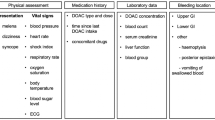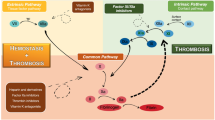Abstract
Background
Although direct oral anticoagulants (DOAC) have proven at least equally effective in the prevention of acute ischemic stroke (AIS) in patients with atrial fibrillation as compared to the vitamin K antagonists (VKA), no reliable data on the severity of AIS of DOAC patients as compared to VKA is available.
Methods
Using a prospectively collected cohort of AIS patients, we performed univariate and multivariate (displayed as adjusted Odds Ratios, OR and 95% confidence intervals, 95% CI) analyses regarding the severity of AIS in patients with preceding DOAC (N = 210) versus VKA (N = 173) therapy. Additionally, we provide a sensitivity analysis considering only patients with warranted therapeutic anticoagulation activity.
Findings
In a comprehensive stroke center population, the frequency of AIS under DOAC was multiple times higher than previously reported at around 6% of all AIS and steadily increasing. National Institute of Health Stroke Scale (NIHSS) in VKA patients (median 7, IQR 2–14) was equal to DOAC (median 5, IQR 2–16) on univariate analysis (P = 0.229). According to the multivariable linear logistic regression analysis adjusting for confounders of severe stroke, VKA was not significantly associated with higher NIHSS scores (β − 0.165, 95% CI − 1.874 to 1.545, P = 0.850) as compared to DOAC. Also in the sensitivity analysis considering only patients with warranted therapeutic OAC therapy, VKA was not significantly associated with higher NIHSS scores (β − 1.392, 95% CI − 3.506 to 0.721, P = 0.195) as compared to DOAC. However, VKA as compared to DOAC was significantly associated with lower rates of good functional outcome at three months (0.527, 95% CI 0.300–0.928), but not with increased mortality (aOR 1.825, 95% CI 0.780–4.273).
Interpretation
Ischemic stroke in patients taking DOAC is an important and frequent scenario. Stroke severity in our real world population dataset is equal in patients taking VKA and DOAC, also in the case of warranted anticoagulation therapy. Preceding VKA as compared to DOAC was associated with lower rates of good functional outcome without excess mortality, but a causal relationship cannot be proven by our study design.



Similar content being viewed by others
References
Ruff CT, Giugliano RP, Braunwald E, Hoffman EB, Deenadayalu N, Ezekowitz MD et al (2014) Comparison of the efficacy and safety of new oral anticoagulants with warfarin in patients with atrial fibrillation: a meta-analysis of randomised trials. Lancet 383:955–962. https://doi.org/10.1016/S0140-6736(13)62343-0
Kirchhof P, Benussi S, Kotecha D, Ahlsson A, Atar D, Casadei B et al (2016) 2016 ESC Guidelines for the management of atrial fibrillation developed in collaboration with EACTS. Eur Heart J 37:2893–2962. https://doi.org/10.1093/eurheartj/ehw210
McGrath ER, Kapral MK, Fang J, Eikelboom JW, O’Conghaile A, Canavan M et al (2013) Association of atrial fibrillation with mortality and disability after ischemic stroke. Neurology 81:825–832. https://doi.org/10.1212/WNL.0b013e3182a2cc15
Almutairi AR, Zhou L, Gellad WF, Lee JK, Slack MK, Martin JR et al (2017) Effectiveness and safety of non-vitamin K antagonist oral anticoagulants for atrial fibrillation and venous thromboembolism: a systematic review and meta-analyses. Clin Ther 39:1456 e36–1478 e36. https://doi.org/10.1016/j.clinthera.2017.05.358
Hellwig S, Grittner U, Audebert H, Endres M, Haeusler KG (2017) Non-vitamin K-dependent oral anticoagulants have a positive impact on ischaemic stroke severity in patients with atrial fibrillation. Europace. https://doi.org/10.1093/europace/eux087
Macha K, Marsch A, Siedler G, Breuer L, Strasser EF, Engelhorn T et al (2019) Cerebral ischemia in patients on direct oral anticoagulants. Stroke. https://doi.org/10.1161/STROKEAHA.118.023877
Meinel TR, Frey S, Arnold M, Kendroud S, Fischer U, Kaesmacher J et al (2019) Clinical presentation, diagnostic findings and management of cerebral ischemic events in patients on treatment with non-vitamin K antagonist oral anticoagulants—a systematic review. PLoS ONE 14:e0213379. https://doi.org/10.1371/journal.pone.0213379
Stöllberger C, Finsterer J (2014) Presentation, therapy and outcome of patients with ischemic stroke under new oral anticoagulants. Neurol Neurochir Pol 48:136–140. https://doi.org/10.1016/j.pjnns.2014.03.001
Granger CB, Alexander JH, McMurray JJVV, Lopes RD, Hylek EM, Hanna M et al (2011) Apixaban versus warfarin in patients with atrial fibrillation. N Engl J Med 365:981–992. https://doi.org/10.1056/NEJMoa1107039
Connolly SJ, Ezekowitz MD, Yusuf S, Eikelboom J, Oldgren J, Parekh A et al (2009) Dabigatran versus warfarin in patients with atrial fibrillation. N Engl J Med 361:1139–1151. https://doi.org/10.1056/NEJMoa0905561 (Massachusetts Medical Society)
Patel MR, Mahaffey KW, Garg J, Pan G, Singer DE, Hacke W et al (2011) Rivaroxaban versus warfarin in nonvalvular atrial fibrillation—supplementary material. N Engl J Med 365:883–891. https://doi.org/10.1056/NEJMoa1009638 (Massachusetts Medical Society)
Giugliano RP, Ruff CT, Braunwald E, Murphy SA, Wiviott SD, Halperin JL et al (2013) Edoxaban versus warfarin in patients with atrial fibrillation. N Engl J Med 369:2093–2104. https://doi.org/10.1056/NEJMoa1310907 (Massachusetts Medical Society)
Xian Y, O’Brien EC, Liang L, Xu H, Schwamm LH, Fonarow GC et al (2017) Association of preceding antithrombotic treatment with acute ischemic stroke severity and in-hospital outcomes among patients with atrial fibrillation. JAMA 317:1057. https://doi.org/10.1001/jama.2017.1371
Sakamoto Y, Okubo S, Nito C, Suda S, Matsumoto N, Abe A et al (2017) The relationship between stroke severity and prior direct oral anticoagulant therapy in patients with acute ischaemic stroke and non-valvular atrial fibrillation. Eur J Neurol 24:1399–1406. https://doi.org/10.1111/ene.13405
Easton JD, Saver JL, Albers GW, Alberts MJ, Chaturvedi S, Feldmann E et al (2009) Definition and evaluation of transient ischemic attack: a scientific statement for healthcare professionals from the American Heart Association/American Stroke Association Stroke Council; Council on Cardiovascular Surgery and Anesthesia; Council on Cardio. Stroke 40:2276–2293. https://doi.org/10.1161/STROKEAHA.108.192218
Lim MS, Chapman K, Swanepoel P, Enjeti AK (2016) Sensitivity of routine coagulation assays to direct oral anticoagulants: patient samples versus commercial drug-specific calibrators. Pathology 48:712–719. https://doi.org/10.1016/J.PATHOL.2016.07.008 (Elsevier)
Ten Cate H, Henskens YM, Lancé MD (2017) Practical guidance on the use of laboratory testing in the management of bleeding in patients receiving direct oral anticoagulants. Vasc Health Risk Manag 13:457–467. https://doi.org/10.2147/VHRM.S126265 (Dove Press)
Toyoda K, Yamagami H, Koga M (2018) Consensus guides on stroke thrombolysis for anticoagulated patients from Japan: application to other populations. J Stroke 20:321–331. https://doi.org/10.5853/jos.2018.01788 (Korean Stroke Society)
Douxfils J, Ageno W, Samama CM, Lessire S, ten Cate H, Verhamme P et al (2018) Laboratory testing in patients treated with direct oral anticoagulants: a practical guide for clinicians. J Thromb Haemost 16:209–219. https://doi.org/10.1111/jth.13912
Touzé E, Gruel Y, Gouin-Thibault I, De Maistre E, Susen S, Sie P et al (2018) Intravenous thrombolysis for acute ischemic stroke in patients on direct oral anticoagulants. Eur J Neurol 25:747–e52. https://doi.org/10.1111/ene.13582
Hozo SP, Djulbegovic B, Hozo I (2005) Estimating the mean and variance from the median, range, and the size of a sample. BMC Med Res Methodol 5:13. https://doi.org/10.1186/1471-2288-5-13
Chow S, Shao JWH (2008) Sample size calculations in clinical research, 2nd edn, vol 61. Chapman Hall/CRC Biostatistics Series, Boca Raton
Pfeilschifter W, Farahmand D, Niemann D, Ikenberg B, Hohmann C, Abruscato M et al (2016) Estimating the quantitative demand of NOAC antidote doses on stroke units. Cerebrovasc Dis. 42:415–420. https://doi.org/10.1159/000447952
Pollack CV (2016) Evidence supporting idarucizumab for the reversal of dabigatran. Am J Med 129:S73–S79. https://doi.org/10.1016/J.AMJMED.2016.06.008 (Elsevier)
Ng KH, Sharma M, Benavente O, Gioia L, Field TS, Hill MD et al (2017) Dabigatran following acute transient ischemic attack and minor stroke II (DATAS II). Int J Stroke 12:910–914. https://doi.org/10.1177/1747493017711947
Nielsen PB, Skjøth F, Søgaard M, Kjældgaard JN, Lip GYH, Larsen TB (2017) Effectiveness and safety of reduced dose non-vitamin K antagonist oral anticoagulants and warfarin in patients with atrial fibrillation: propensity weighted nationwide cohort study. BMJ 356:1–10. https://doi.org/10.1136/bmj.j510
Vinogradova Y, Coupland C, Hill T, Hippisley-Cox J (2018) Risks and benefits of direct oral anticoagulants versus warfarin in a real world setting: cohort study in primary care. BMJ 362:k2505. https://doi.org/10.1136/bmj.k2505
Larsen TB, Skjøth F, Nielsen PB, Kjældgaard JN, Lip GYH (2016) Comparative effectiveness and safety of non-vitamin K antagonist oral anticoagulants and warfarin in patients with atrial fibrillation: propensity weighted nationwide cohort study. BMJ 353:i3189. https://doi.org/10.1136/bmj.i3189
Hylek EM, Go AS, Chang Y, Jensvold NG, Henault LE, Selby JV et al (2003) Effect of intensity of oral anticoagulation on stroke severity and mortality in atrial fibrillation. N Engl J Med 349:1019–1026. https://doi.org/10.1056/NEJMoa022913 (Massachusetts Medical Society)
Funding
None.
Author information
Authors and Affiliations
Corresponding author
Ethics declarations
Conflicts of interest
Mr. Meinel has received travel grants from Pfizer. Mr. Kaesmacher has received travel grants from Pfizer and Stryker. Dr. Fischer is a consultant for Medtronic, CSL Behring and Stryker, outside the submitted work. Marcel Arnold received speaking fees and honoraria for scientific advisory boards from Covidien and Medtronic, outside the submitted work. All other authors have nothing to disclose.
Ethical standard
This study has been approved by the appropriate ethics committee and performed in accordance with the ethical standards laid down in the 1964 Declaration of Helsinki.
Electronic supplementary material
Below is the link to the electronic supplementary material.
Rights and permissions
About this article
Cite this article
Auer, E., Frey, S., Kaesmacher, J. et al. Stroke severity in patients with preceding direct oral anticoagulant therapy as compared to vitamin K antagonists. J Neurol 266, 2263–2272 (2019). https://doi.org/10.1007/s00415-019-09412-y
Received:
Revised:
Accepted:
Published:
Issue Date:
DOI: https://doi.org/10.1007/s00415-019-09412-y




